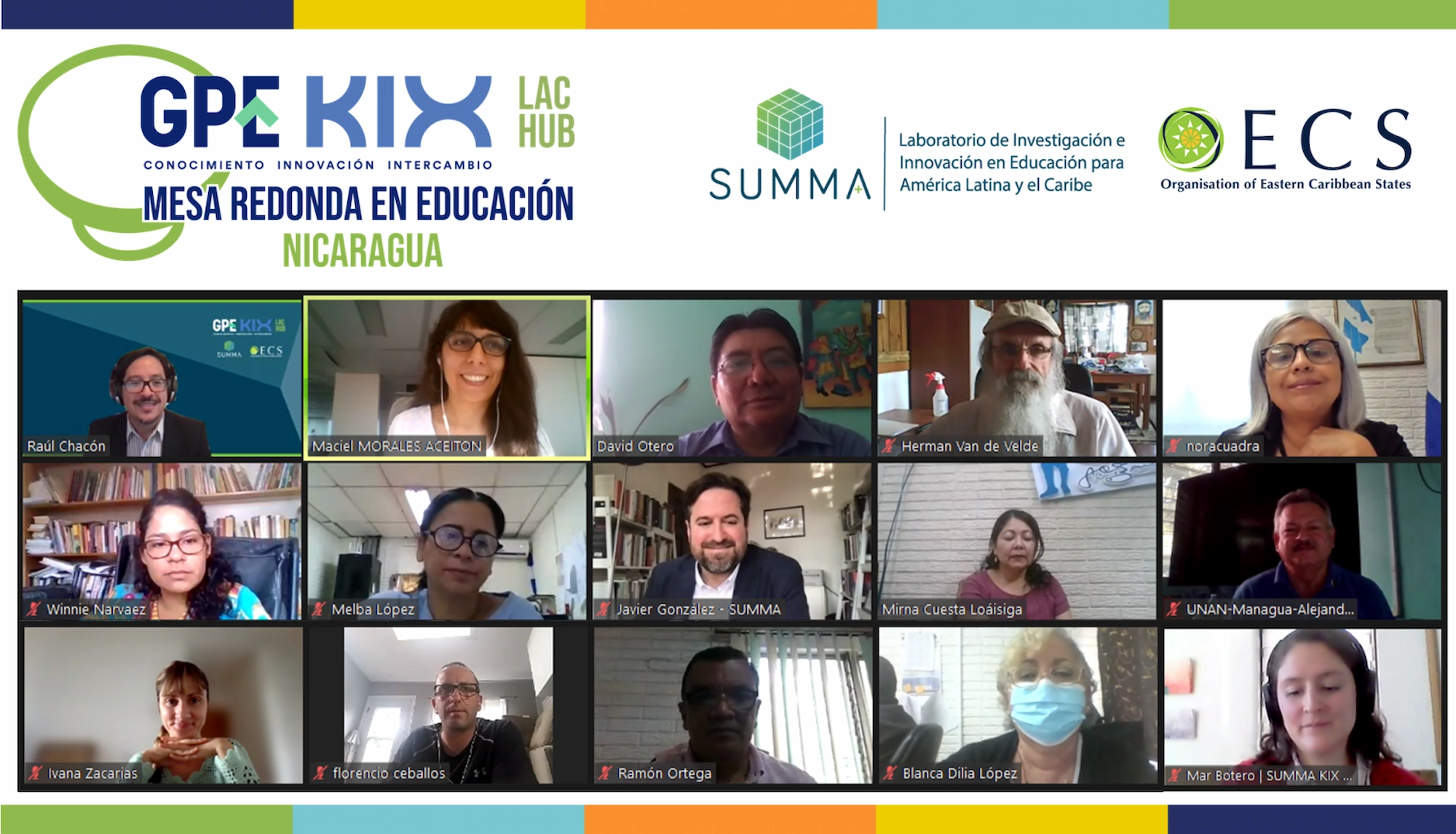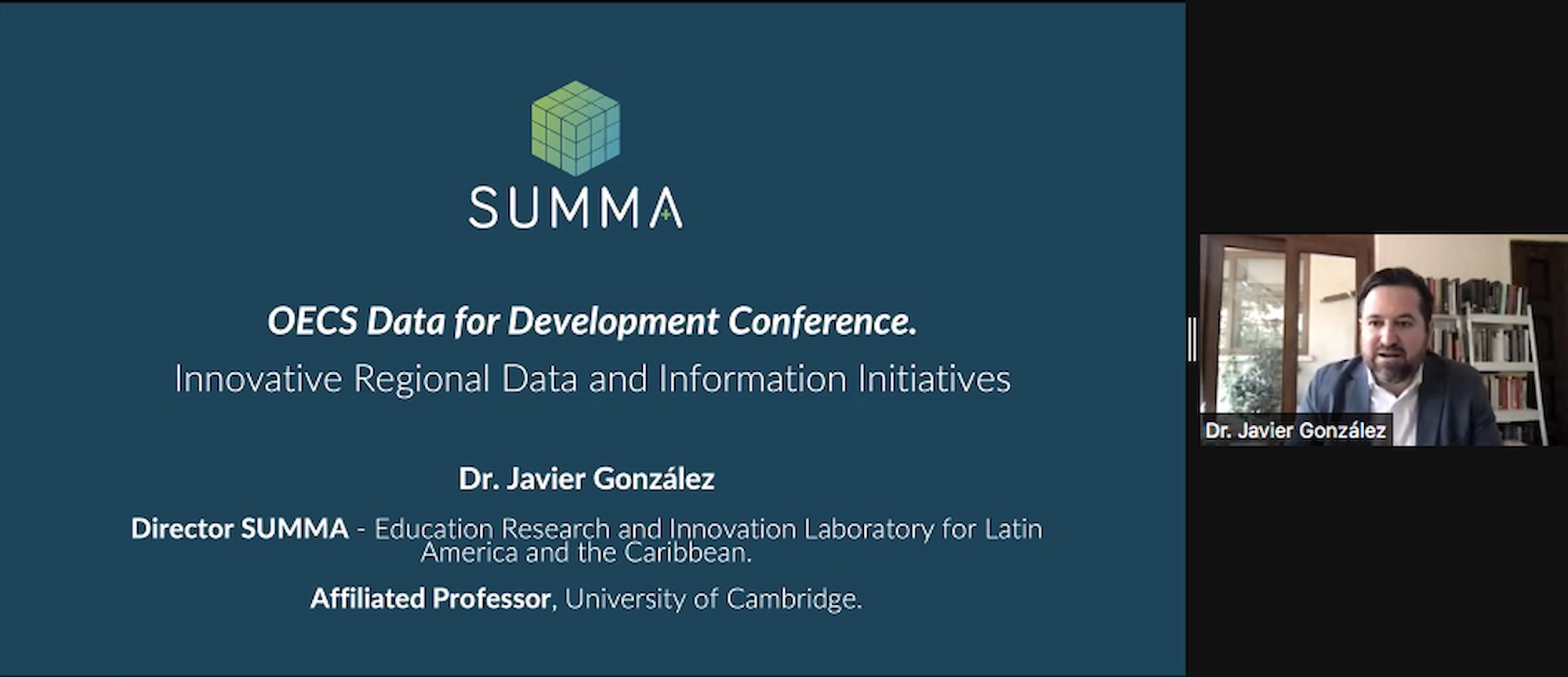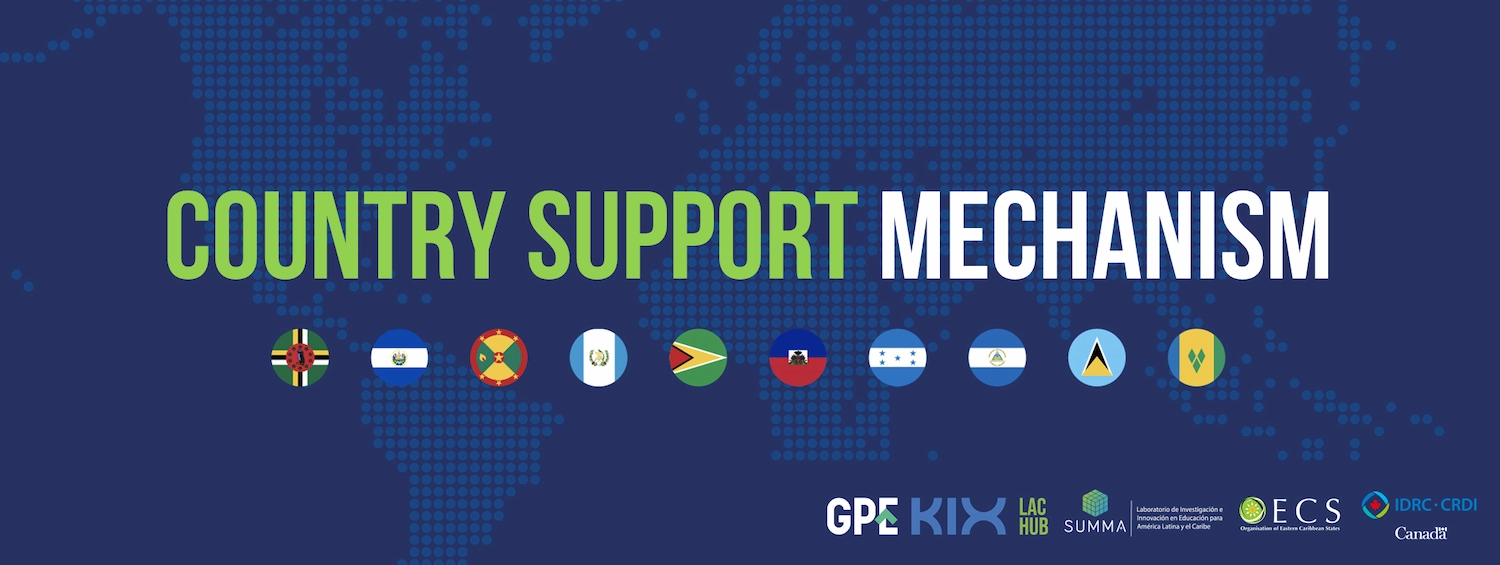Winning Initiatives of the 2nd Call for Innovation for Educational Justice in Central America and the Caribbean
13 de December de 2022

Share
Following the successful application of 25 initiatives from 10 countries to the 2nd Call for Innovation for Educational Justice in Central America and the Caribbean, the webinar “Lab-Ed SUMMA: promoting education for Educational Justice” was held, during which the 4 winning innovations of this second edition were recognized.
The call, organized by SUMMA y OECS throught the KIX LAC program, with the support of IDRC Canada, awarded each one with $10,000 dollars for its implementation and technical support with a workshop on theory of change and sustainability plan.
Raul Chacón, SUMMA – KIX LAC program director,welcomed the attendees and gave special thanks to the 25 teams that presented their initiatives, highlighting the general desire to have a social impact and the desire to scale them beyond the communities where they are currently being implemented, “innovation is not only about creative ideas, but also about recognizing what needs different types of support to achieve concrete and measurable results”.
For its part, Florencio Ceballos, senior program at IDRCcongratulated the initiatives, highlighting that “we understand that scaling is a complex, progressive and multi-stage process of building evidence and knowledge, and these innovations are a very important part of the educational ecosystem in the Latin American region, being led and supported by SUMMA”.
The purpose of the call was to identify and promote solutions to the main challenges and problems faced by the region’s education systems. The initiatives recognized were:
🏅 1. Promoting gender equality in schools – On Continue!
Which seeks to reduce gender inequalities by promoting equal opportunities between girls and boys in rural and urban areas in St. Lucia, Dominica and St. Vincent and the Grenadines, through teacher training and sensitization of students under their own e-learning method. Expected to reach 25 French-speaking teachers and 300 English-speaking teachers; and about 400 students in 3 schools per country between the ages of 13 and 16.
🏅 2. Conecta Aprende of the Zamora Terán Foundation – Honduras
Learn & Connect is a teacher professional development program focused on the transition to virtuality, digital literacy and reading and writing, which adopts the structured pedagogy approach and is supported by the integration of technology, based on the Technological Pedagogical Content Knowledge (TPACK) model, which highlights the necessary linkage between the different knowledge and domains of the teacher: disciplinary, pedagogical and technological. The program allows the teaching of the use of virtual platforms for didactic purposes and integrates families in the children’s learning process.
Target audience:
- Primary school teachers between 18 and 50 years old (1st to 6th grade), in Nicaragua and Honduras. Expected to reach 850 teachers in vulnerable communities.
- Rural and marginal urban public and subsidized schools serving children with limited economic resources.
- Students between 6 and 13 years of age (1st to 6th grade) together with their parents.
- Vulnerable families.
🔎 Learn more about this initiative
🏅 3. Bay Island Educator Leadership Programme – Partners in Education Roatan (PIER)- Honduras
The objective is to strengthen and enhance the capacities of teachers in the department of Islas de la Bahia (Honduras) to improve the learning of students whose educational community is culturally and linguistically diverse. Also, to promote the capacities of teachers so that the knowledge acquired can be used to solve problems.
The project will be carried out using the trainer of trainers methodology.
Target audience:
It is expected to reach 60 teachers in the program, indirectly benefiting +700 teachers and +10,000 students and 4 schools and their educational community.
Teachers between 28 and 45 years of age, with a minimum of 5 years of experience and currently working in governmental and non-governmental institutions (rural and urban) in the municipalities of: Utila (10%), Guanaja (20%), Roatán (40%) and Santos de Guardiola (30%).
🔎 Learn more about this initiative
🏅 4. Strengthening skills in learning
Fundación Pedagógica de Cooperación Genuina (FUPECG) – Nicaragua
The purpose of this innovation is to implement an alternative evaluation system, contextualized and inclusive both at the level of participants and those who apply it, in line with the models of health and community education that exist in Nicaragua. By being able to assess the real quality of basic skills in reading, mathematics and social interaction of our children, it will also be possible to develop and implement a path for their improvement. They hope to reach 1200 homes and will be based on the Teaching at the Right Level (TaRL) methodology.
Target audience:
- Boys and girls between 6 and 13 years old (50% male and 50% female) in the municipality of Esteli (sample of 1200 households). Lo mismo con las personas adultas (al menos una por hogar).
- Normal students between 18 and 25 years of age.
- School teachers.
🔎 Learn more about this initiative
Next, María José Sepúlveda, Director of Program Evaluation and Educational Policies at SUMMA, presented on “Innovation and recovery of learning in post-pandemic contexts”, highlighting the path from the identification of gaps and educational challenges, to the contextualization of innovative policies and practices that have a positive impact through the systematization of experiences and evidence, to achieve the generation of scalable proposals at the regional level and finally, to impact by taking the evidence to the various actors of the education ecosystem. She also shared the Plataforma de Prácticas Efectivas and the Mapa de Innovaciones developed by SUMMA.
Afterwards, Elma Barahona from the Universidad Nacional Pedagógica Francisco Morazán Honduras and member of the follow-up committee of the initiatives, shared her own experience of visiting a school with the “Conecta aprende” initiative, highlighting the construction of a nurturing climate for collective learning. “I loved how the actors interact from a look of respect, from safety as a platform for this initiative where much emphasis is placed on socioemotional dynamics, generating a space for communication and much more constructive relationships. The teachers are producing specific data that allow them to understand their reality in the children’s learning and what they need for the project to be scalable”.
Also, Charmaine Bissessar of the University of Guyana and also a member of the monitoring committee, recognized the motivation that these initiatives have generated for her to accompany their implementation, since they have all been able to demonstrate that they have achieved what was planned, even in post-pandemic contexts. She also valued the importance of the fact that these initiatives speak of educational justice, gender equality, indigenous peoples and social-emotional intelligence”.
At the end of the meeting, Celeste Burton from the OECS, thanked especially the innovations of the Caribbean countries and from the OECS said that it had been talking about how innovation can be applied as a multidisciplinary element in the places where the educational system needs the most attention. He also emphasized the importance of ongoing research and data collection to be able to continue informing the processes and the cooperative approach with other organizations that help to disseminate this information.
Subsequently, a theory of change workshop was held for the members of the groups of the 4 recognized initiatives.
🎥 Seminar “Lab-Ed SUMMA: promoting education for Educational Justice”.





















































































































